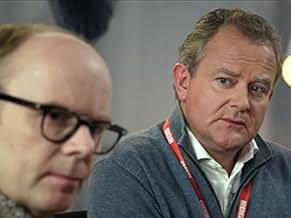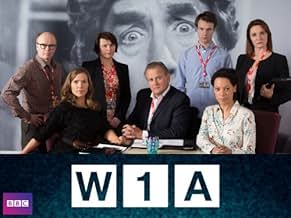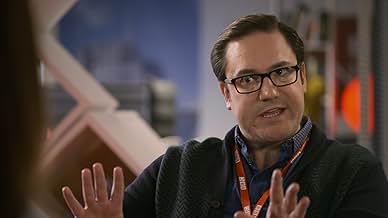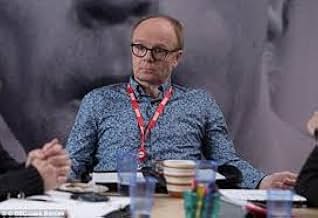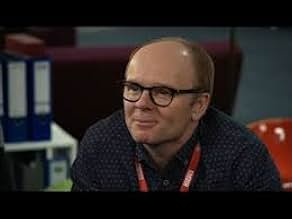IMDb RATING
7.8/10
3.4K
YOUR RATING
Ian Fletcher, formerly the Head of the Olympic Deliverance Commission, has taken up the position of Head of Values at the BBC.Ian Fletcher, formerly the Head of the Olympic Deliverance Commission, has taken up the position of Head of Values at the BBC.Ian Fletcher, formerly the Head of the Olympic Deliverance Commission, has taken up the position of Head of Values at the BBC.
- Won 1 BAFTA Award
- 3 wins & 3 nominations total
Browse episodes
Featured reviews
I suppose the natural career change for "2012"'s Olympics supremo Ian Fletcher was to an executive position at another of the great talking-shops, the BBC itself. Thus "W1A" continues very much in the footprints of its predecessor, with Fletcher at the centre of the middle of things at the Beeb, quickly becoming the spokesperson and whipping boy for a number of topical-at-the-time scandals at the corporation, involving regional discrimination and pay levels. Now with the Quango-esque title "Head Of Values" he's soon involved with a similar group of headless deadbeats talking lots but saying little in another amusing spoof comedy.
The problem for me was the too-similar format to "2012" right down to each episode starting with him turning up to work and attending morning meetings although this time there was much less emphasis on his private life. The supporting cast includes the excruciatingly on-point media guru Siobhan "Sure, great" from the show before and a bunch of colleagues not markedly different again to those before. Therein lies the problem, with the show somewhat lacking in freshness with not only the characters but some of the plot devices seeming a bit second hand. I also think more could have been done to make use of the real-life BBC talent available apart from the amusing spat between Clare Balding and Carol Vorderman to see who gets to partner Alan Titchmarsh in a new reality show "The Tastiest Village in Britain".
There are amusing moments for sure particularly when Siobhan attempts to rebrand the BBC for the Apps market and Bonneville leads a good cast who play their quirky characters to the hilt. Nice to see Olivia Colman in a cameo role too. All told though, the law of diminishing returns appears to be in action here although somehow it wouldn't surprise me to see Ian Fletcher in future park his fold-down bike at the biggest talking-shop of all the House of Commons in an as yet unwritten sequel to his latest misadventures.
The problem for me was the too-similar format to "2012" right down to each episode starting with him turning up to work and attending morning meetings although this time there was much less emphasis on his private life. The supporting cast includes the excruciatingly on-point media guru Siobhan "Sure, great" from the show before and a bunch of colleagues not markedly different again to those before. Therein lies the problem, with the show somewhat lacking in freshness with not only the characters but some of the plot devices seeming a bit second hand. I also think more could have been done to make use of the real-life BBC talent available apart from the amusing spat between Clare Balding and Carol Vorderman to see who gets to partner Alan Titchmarsh in a new reality show "The Tastiest Village in Britain".
There are amusing moments for sure particularly when Siobhan attempts to rebrand the BBC for the Apps market and Bonneville leads a good cast who play their quirky characters to the hilt. Nice to see Olivia Colman in a cameo role too. All told though, the law of diminishing returns appears to be in action here although somehow it wouldn't surprise me to see Ian Fletcher in future park his fold-down bike at the biggest talking-shop of all the House of Commons in an as yet unwritten sequel to his latest misadventures.
Not sure an American audience would get this show as it very definitely reflects British cultural and social situations.
Such a great series I watched it twice. Wonderfully acted and written, the single word interplay between the characters is a marvel. The discipline and skill to pull off the rapid-fire exchanges is something to behold. While much of the humour is broad, much of it is wonderfully narrow British irreverence and wit. But the glue that holds it together is Hugh Skinner's Will. His beautifully-timed nonsensical statements sum up the entire series, making fun of corporate culture that has lost its ability to communicate, saved at the last moment by the erudite adult in the room, Ian Fletcher.
I found this very funny and very true. I worked at BBC Future Media (and other parts of the BBC) and recognise a number of these senior managers. The caricatures are not far removed from reality. On the creative side, you might think the show was cruel. Not really, they used to have weekly "creative sessions" in my kitchen area. There's nothing like the sight of desperate 40-somethings trying to come up with something young and hip to make you wish you were far, far away from the commissioning process and the necessary obliges noblesses! The meeting rooms, "Strictly Come Dancing" and "Top Gear" and so on, and Syncopatispace is beyond parody. This show is almost exactly like working there.
I suspect that some of the reviews here have been made by people who are perhaps too close to the BBC, or are amongst a significant section of the British population who regard the licence fee as the wrong way to fund the Corporation.
I didn't see "Twenty Twelve" (but have just ordered the DVDs of Series 1 & 2), and in fact have only managed to see the first two episodes of "W1A". That clearly leaves me open to criticism for reviewing a series I haven't fully seen. On the other hand, it meant that I had no particular expectations before I viewed.
What I did see I found to be hugely funny - certainly one of the most wryly observed and succinctly written comedies of recent years.
Yes, I am sure that what it portrays is desperately close to reality! And indeed, that is what makes it all the funnier. The characters are, of course, caricatures with little depth, but in a light-hearted series of just four episodes, I doubt we would be expecting serious character development, especially when some of them speak the same (or similar) lines in every episode.
As a Brit who loves the BBC, despite its weaknesses and failings, and who thinks the licence fee is truly excellent value for money, I admire the organisation all the more for its willingness to have the mickey taken in this way.
Reading the other reviews, you might think that there was little to laugh at in this short series. Far from it. I very rarely laugh out loud, but this had me chortling more than most.
I didn't see "Twenty Twelve" (but have just ordered the DVDs of Series 1 & 2), and in fact have only managed to see the first two episodes of "W1A". That clearly leaves me open to criticism for reviewing a series I haven't fully seen. On the other hand, it meant that I had no particular expectations before I viewed.
What I did see I found to be hugely funny - certainly one of the most wryly observed and succinctly written comedies of recent years.
Yes, I am sure that what it portrays is desperately close to reality! And indeed, that is what makes it all the funnier. The characters are, of course, caricatures with little depth, but in a light-hearted series of just four episodes, I doubt we would be expecting serious character development, especially when some of them speak the same (or similar) lines in every episode.
As a Brit who loves the BBC, despite its weaknesses and failings, and who thinks the licence fee is truly excellent value for money, I admire the organisation all the more for its willingness to have the mickey taken in this way.
Reading the other reviews, you might think that there was little to laugh at in this short series. Far from it. I very rarely laugh out loud, but this had me chortling more than most.
Did you know
- TriviaThe cast list gives Ben and Jerry's surnames as Rosenstern and Guildencranz. This is a reference to Rosencrantz and Guildernstern, two minor characters in Shakespeare's play National Theatre Live: Hamlet (2015). In Tom Stoppard's play of 1966 National Theatre Live: Rosencrantz & Guildenstern Are Dead (2017) he flips the plot and they become the major characters. In Stoppard's play they are like two halves of a single character and other characters in the play have trouble distinguishing which one is which; much like the hapless Ben and Jerry.
- ConnectionsFeatured in The Wright Stuff: Episode #19.55 (2014)
- How many seasons does W1A have?Powered by Alexa
Details
Contribute to this page
Suggest an edit or add missing content


